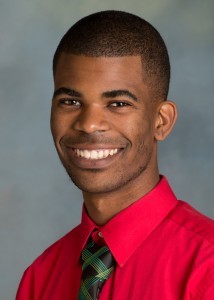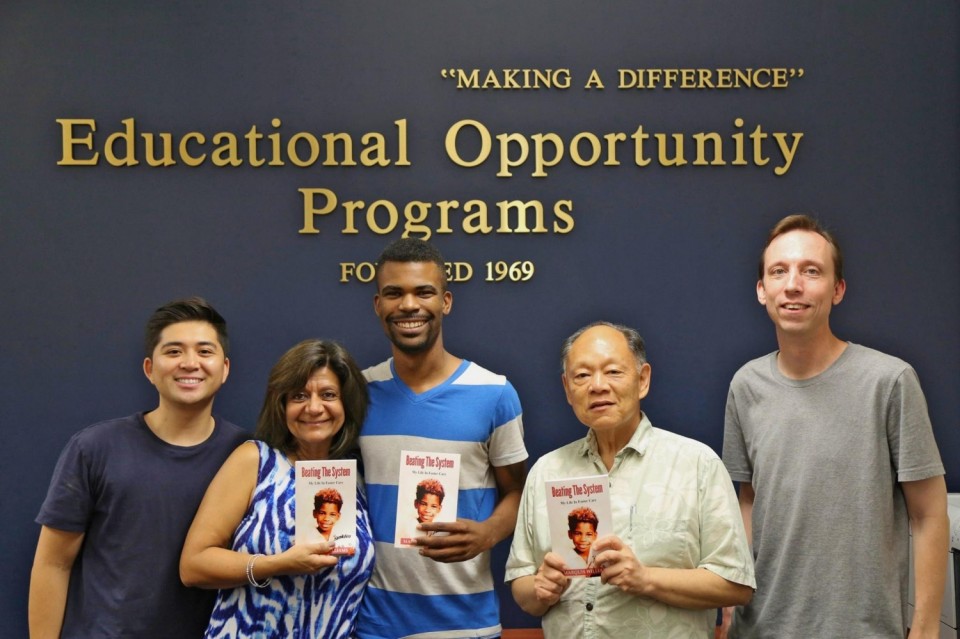CSUN Alumnus Marquis Williams Uses Incredible Story to Help Others
 The numbers were not on his side.
The numbers were not on his side.
Marquis Williams ’14 (Tourism, Hospitality and Recreation Management) bounced around between 10 different foster homes, attended more than a dozen schools between the ages of 8 and 12 and held a 1.9 GPA in high school.
When it came time to apply to colleges, the South Los Angeles native was denied admission from nine out of the 10 schools he applied to.
The one school that saw Williams’ untapped potential was California State University, Northridge, which accepted Williams through the university’s Educational Opportunities Program (EOP). The program is designed to support historically low-income, educationally disadvantaged, first-generation students.
“While my peers were applying to schools across the country, I did some research and found out about EOP at CSUN. The program was my only hope as far as going to a university,” Williams said. “In my freshman year of high school, I failed all my classes and by my junior year I had already been to 14 different schools. I really lacked the motivation to continue and I wasn’t focused on academics at that point.”
By the time Williams came to CSUN, academics had become a top priority. According to EOP Faculty Mentor Program Coordinator Glenn Omatsu, Williams was determined to make use of the second chance that EOP provided him.
The same student who struggled to reach a 2.0 GPA had a perfect 4.0 after his first semester and a 3.4 by the time he graduated.
In August, Williams published his first book, “Beating the System: My Life in Foster Care”, which documents his experience navigating the foster care system and overcoming his childhood struggles to become a college graduate.
“The process of writing the book was very therapeutic to me,” said Williams, who has worked as a counselor for several nonprofits since graduation. “Once I graduated [from CSUN] and reflected on my story, I thought it would be a good idea to start journaling. This idea came from an assignment Professor Omatsu had me do where I wrote an essay about my life and compared it to a metaphor. I took those concepts and applied it to my book, and in six months I finished it.”
Williams said that going through EOP’s Summer Bridge Program — a six-week long program designed to give incoming freshmen an intensive pre-college experience — transformed his view on education.
“During those six weeks, I understood that I had been given a second chance and an opportunity to prove that I deserve to be a student on campus,” Williams said.
Williams’ success story didn’t come without its challenges. Growing up he never had a chance to settle at one place, going from one foster home to another and frequently switching schools.
“There were definitely some social challenges — I wasn’t able to connect with other students since I was always the new kid at school, and I’d always have to leave behind the few friends I had,” Williams said. “Academically, it was also tough because I’d be thrown into a new school and have a new teacher. It was tough to keep up.”
College didn’t cross Williams’ mind until his grandmother, who ended up taking full custody of him, transferred Williams to a college prep charter high school.
The school, Heritage College-Ready Academy, focused on getting its students ready for higher education.
“Something clicked. The school was much smaller so it was easier for me to focus in class and there was a focus on sending students to college,” Williams said. “This was big for me because before attending this school, college wasn’t on my mind at all.”
Williams credited Omatsu and EOP Director Shiva Parsa for helping shape and mold him once he came to CSUN.
“They gave me a voice. I used to either shy away from telling people my story or I wouldn’t see the importance of it,” Williams said. “They helped me understand that what I’ve overcome shows resilience and that I should share my experiences with others so they can have hope and inspiration.”
Sharing is exactly what Williams did.
After two years as a student in EOP, Williams applied to be a mentor in the program in order to share with students how he overcame his own personal struggles.
According to Omatsu, Williams felt it was his obligation to share his experiences with others.
“When [Williams] shared with students about his life experiences, they were both surprised and grateful,” Omatsu said. “They were surprised because up until then, they had perceived him as only a high-achieving student who seemingly hadn’t had as many hardships as them. They felt this way because he was always smiling.
“The students were also grateful because they learned that he never shared his life experiences with a group of people before, but wanted to do so with the students because of the supportive community they created,” Omatsu added.
Moving forward, Williams hopes to continue touching the lives of those who were in similar situations as he was.
“I see myself working with the foster youth population, advocating on their behalf and just doing whatever I can to help make a difference,” Williams said.
William’s book, “Beating the System: My Life in Foster Care” can be found on Amazon and Barnes and Noble.


 experience
experience